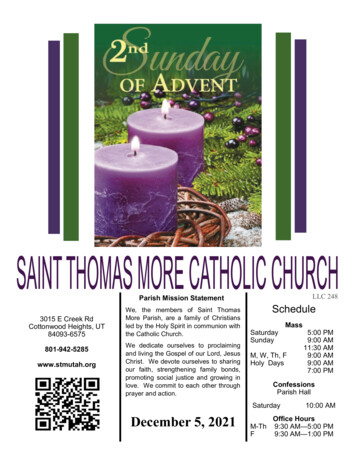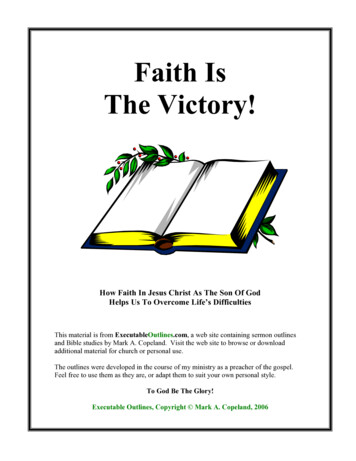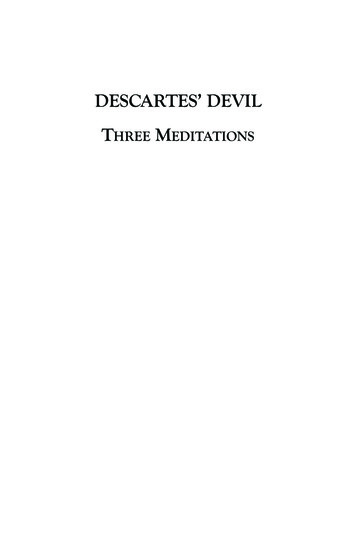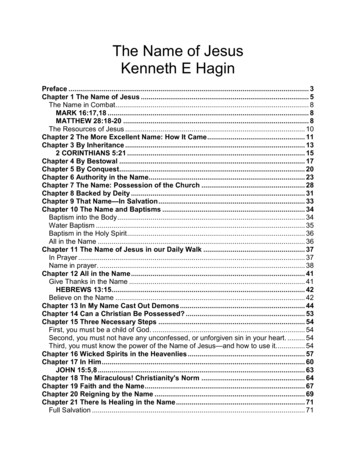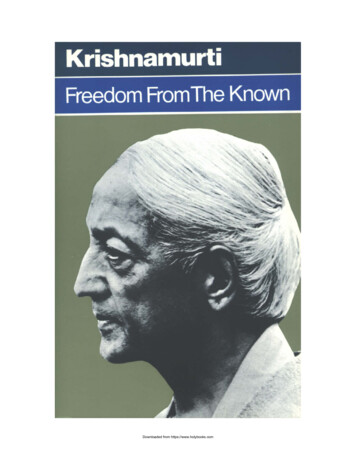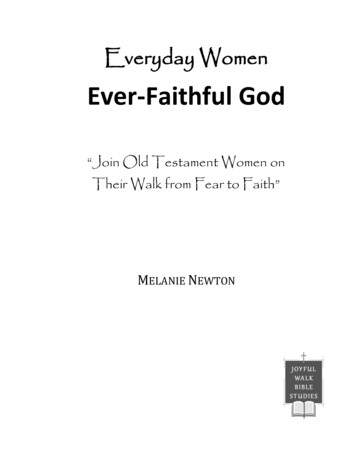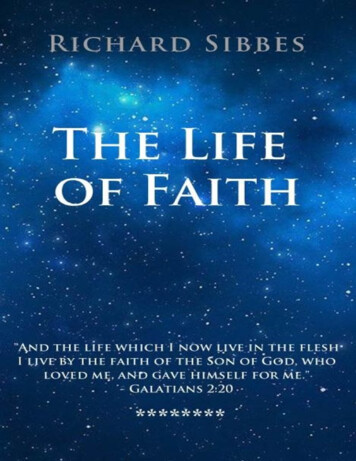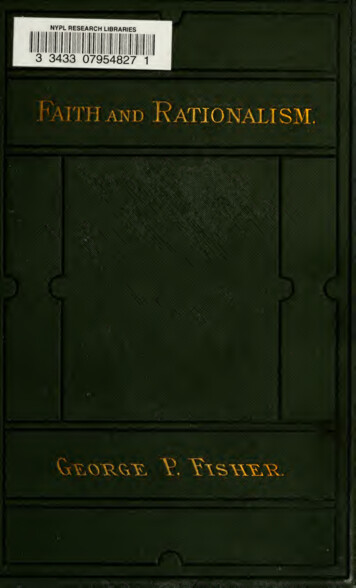
Transcription
NYPL RESEARCH LIBRARIES3 3433 07954827"Faith and Rationalism.fWSS , Y O Cv" "?.YlSY U.
lAAr-rTTicL. rye -C ',/- -e
rJII ruK»-yI"ZITT
FAITHAND RATIONALISMWITHSHORT SUPPLEMENTARY ESSAYS ONRELATED TOPICSBTGEOEGE P? ISHERD. D.PEOFESSOB OF ECCLESIA6TICAI. HISTOBY IN TALE COLLEGE.Ifany manwilldo Hiswill,heGod, or whethershallIknowof the doctrine, whetherspeak of myself.Johnvii. 17.KEW YORKCHARLES SCRIBNER'S SONS743 and 745 Broadway1879itbe of
COPYBIGHT, 1879.BY CHARLES SCRIBNER'S SONS.Grant, FaikesElectrotypcrs feitRoDfiEiis,Printers,PuiLADELrUIA,
vxKOi rTi,KalBf avflpwiro? ov Se' eTat Toi ToOoilwveu/xaTOS ToC Oeov.fiufoTai yvCtvan, OTI jrv«vftaTt«I»syap avT*ffitapiaayaKpiyerai, — 1 Cor.ii.14.if we will truly consider it, it is more worthy to believe thanwe now know. For in knowledge man's mind suffers fiom sensewhich is the reflection of things material—but in faith the spirit suffers fromspirit which is a worthier agent. Otherwise it is in the state of men glorified, for then faith shall cease, and we shall know even as we are known.""Howbeit,toknowas"The use of human reason in matters of religion is of two sorts the former in the explanation of the mystery, the latter in the inferences derivedfrom it. With regard to the explanation of the mysteries, we see that God;vouchsafes to descend to the weakness of our apprehension, by so expressing His mysteries that they maybe most sensible to us; and by graftingHis revelations upon the notions and conceptions of our reason; and by applying His inspirations to open our understandings, as the form of the keyto the ward of the lock. But here we ought by no means to be wanting toourselves for as God uses the help of our reason to illuminate us, so should;every way, that he may be more capable of receiving andunderstanding His mysteries provided only that the mind be enlarged, according to its capacity, to the grandeur of the mysteries, and not the mysteries contracted to the narrowness of the mind."" But as the use of the human reason in things divine is of two kinds, solikewise in the use are two kinds of excess; the one when it inquires toocuriously into the manner of the mystery; the other when the same authoWherefore itrity is attached to inferences as to principles.andtemperateappears to me that it would be of especial use and benefit if acareful treatise were instituted, which, as a kind of divine logic, should laydown proper precepts touching the use of human reason in theology. Forit would act as an opiate, not only to lull to sleep the vanity of curious speculations, wherewith sometimes the schools labor, but also in some degreewelikewise turnit;**************wherewith the Church is troubled.reckon among the things deficient; and call it Sophron, orThe Legitimate Use of Human Reason in Divine Subjects.' Bacon, De Augmen-to assuage the fury of controversies,Suchtis, b.a treatise Iix.—
—" Je sais qu'dans rilesprit, eta touIu qu' elles"—Ics v6rit63 divinesnon pas de1'—"entrent du coeuresprit dans le coeur, pour humilier cette su-perbe puissance du raisonnement qui pr6tend devoir 6tre juge des choseaquelavolont6 choisit; et pour gu6rir cette volont6 infirme, quirumpue parses sales attachements.lant des choseshumaines ondit qu'Et deillas'est cor-vient qu' au lieu qu' en par-faut les connaitre avantque delesaimer, ce qui a pass6 en proverbe [ignoti nulla cupido]: les saints au contraire disenten parlant des choses divines qu'ilfaut les aimer pour leaconnaitre et qu' on n' entre dans la v6rit6 que par la charity, dontfaitune de leurs plusPersuader).utiles sentences."Pabcal, Opuscules (de1'ilsontArt de
PREFACE.Having beenPrincetoninvited toTheologicalforitSchool,was possiblestem.essays,It turns out,which they grew.book.I hardlythemetheto read in the time—branches,muchproperasitwere, of the mainhowever, that the branches inthe aggregate take upoffoundI wrote, also, several supple-such a discourse.mentaryIso attractive, that I wrotewhich I had chosenmore thandeliver an address at tliemore room than the stem outSuchisthe origin of the presentneed add that the hospitality ofmybrethren at Princeton does not render them in theleastanswerable foritscontents.G. P. F.New Haven,April 14, 1879.
CONTENTS.PACK.St Paul on the Limits of our KnowledgeCharacteristics of Faithin Religion.1213.Connection of Faith with Feeling15Connection of Faith with the Will16Criticism of Locke's Definition of Faith16.Extreme Supernaturalism of the early SociniansThe Characteristic Temper of Rationalism19Rationalism intolerant of Mysteries22What23is20Meant by a Mysterious TruthMystery not unfavorableto PietyRationalism in conjunction with Orthodox Tenets26.Rationalism overlooks the Influence of Sin upon the Intellect2728.Rationalism ignores the Premises of Faith29Different Degrees of Vividness in the Perception of Sin.30Catholic Nature of the Christian Sense of Guilt and of Sin.32Tendency of Rationalismto take no account of implicit Reason-ing33Tendency of Rationalismligion.to exaggerate the ofBce of Logic in Re-.Tendency of Rationalism.34,to resolve Christianity into a DoctrineRationalism inclined to seek for Knowledge forThe True Motivein the Search for Religiousitsown SakeTruthSafeguards against Fancy and EnthusiasmThe Debatable Ground abouta great Religious TruthLimits of Responsibility in meeting ObjectionsThe SourcesGodFaith in God and1*Relation of the Will toin Conscience.36.37.to Christianof our Belief in.Truth.9374042434549
CONTENTS.10PA611.The Sources of Faith in a Future Life50TheMysteryof the Trinity63The Problemof Universal Sin and Individual ResponsiblonessInsufficiency of the MoralView of the Atonement.Reasonablenesss of the Doctrine of the Spirit's InfluenceSpiritual Insight requisite in the Interpretation of ScriptureContradictory Judgments of IntellectualMen upon BooksBiblePower actually exerted by the Writings of PaulBishop Butler on a priori Ideas respecting Revelationtoa j)riori Expectations59.62,.64of the.6566.69.The Authority of Scripture not limited by Personal InsightThe Divine and Human Elements in ScriptureThe Grand Aim of Christianity an Argument for its Truth.5G.Rationalism involved in a priori Views of ScriptureThe Gospels not conformed.6971.74.75.77APPENDIX.I.The Teaching of Theology on the Moral Basis of Ilugoof St. ards.92
CONTENTS.11' Schleiermacher.PAGK.93",93Recent German TheologiansColeridgeJ.H.93Newman9711.The Doctrine op Nescience Respecting God.How"the Infinite"farisKnowable.Spencer's Criticism of Paley's Illustration99102III.The Doctrine op Evolutionthe Argu-in its Relation toment OF Design.Meaning of Evolution104The Relation of Science to ReligionThe Alternative of Design or Chance106108Necessity of assuming Design,.Natural Selection generates NothingVariationis109Illunder Guidance112Analogy between Works of Nature and of Art116Theoryof "Conditions of Existence"118Mind consciously distinct from its OrganismThe Intuition of Self completes the Argument122of Design.125IV.The Reasonableness of the Christian Doctrine of Prayer.Fundamental Idea of PrayerPetition not Dictation.128.Limits to the Proper Sphere of PetitionMeansOurof answering Prayer for SpiritualBelief in the SupernaturalTheisticis".Goodsubject to EducationView of the Order of Nature129130131.133134
CONTENTS.12PAGE.Nature a Part of a more Extensive SystemWaysof answering Prayer for PhysicalInterposition through theThe UniformityThe Proposal tomedium.135,Changesof Naturalof Nature and MiraclesLaw136137.test experimentally the Efficacy of139Prayer141V.Jesus was not a Religious Enthusiast,Self-scrutiny necessary to Christ146His Sobriety tested by the Ordeal of Suffering147His Holiness precludes Self-exaggeration148His Anticipations verified149VI.The Moral and Spiritual ElementsThe Problem oftheinthe Atonement.Atonement150Examination of the Views of President Edwards. TheTheory of Dr. J. McLeod CampbellThe leading Ideas of Luther.150160163Exposition of Schleiermacher's DoctrineJThe Theory174of RotheTendenciesof Modern Theology onRemarksofthis SubjectCanon Mozley.67.181182VII.The Unity op Belief amongChristians.Doctrine and the Philosophy of Doctrine185Unity in respect to Fundamental Truth185Differences from Ambiguity ofLanguage187
FAITH AND RATIONALISM.Gentlemen of the Theological School:I tlianktoyouyoufor the opportunity givento-night.who canYou havemeinvited to addressto speakyou oneclaim to represent no party or school intheology, butwhofeelshimself drawn with an in-creasing conviction to the catholic truth which hasbeen thelifeChurch.YouofChristian piety inwill not expectmeallages of theto traverse the oldground where our fathers crossed their lancesgone by.ISTor willyou prefer thatin timesI should retreat tosome scholarly theme, not more pertinentat one timethan at another, and remote from the questions thatcommandthe attention of thinkingmenat present.Eelying on your candor, I choose rather to expressfranklymythoughts in connection with a subject,which, though never void of interest,of special concern,Truth;—theis,in our day,Ascertainment of Eeligiousor, to state it otherwise,Faith and Eation-ALISM.11
FAITH AND RATIONALISM.12Those who are inclinedchafetotheatnarrowbounds and indistinct nature of our knowledge inmay rememberreligion,their comfort that theforApostle Paul, though conscious of being an organ ofdivine revelation, places himself in the same categorywith themselves.' We knowin part,"see through a glass darkly."Ithe says:We''was not a completeview, but a fragmentary one that he had of divinetruth; aswhen youlook off to a mountain thatpartly hidden under clouds.for a certain distance,A peak,itsYoufollowit islost in theand thenoutlinemist.here and there, emerges in the sunlight, butconnection with the mass belowbrokenisthe perception even of what the Apostle dida certain obscurity attendinging of the objectit.itself directly.image that was discerned,dimitsisItAndoff.know hadwas not a behold-Itwas only alike that reflectedfaintfrom aThemetallic mirror of the sort used in his time.language in which we utter religious thought, and theconceptions at the basis ofbe the lispings of achild,and ideas that belonganswerfor the infant,supersededreality.toare declaredby himtocompared with the wordsTheymature manhood.but in course of time they areby somethingmoreconformedtotheYet, the boundaries that are set about ourknowledge during ourofit,the realmofthelifeon earth, and the immensityunknownthat stretchesaway
CHARACTERISTICS OF FAITH.beyond our ken 'withscepticismcovered.respectanythingtowhich had been disclosedbeen well said by Paley thatIt hasactuallyfordis-from the confidenceIt did not subtract a jotof Paul in that truthwarrantnot the leastaffordI3''to him.true fortitude ofunderstanding consists in not suffering whatwe doknow*whoto be disturbedknowing adespairs ofknowall,mayby what we do not know."little,Hebecause he cannotbe compared to onewhoissobewil-dered by the thought of the vast amount of painand sorrowin the world,to relieve, that heit isdoes not thinkhandstretch out hiswhichto the one orbeyond his powerittwoworth whiletosufferers withinhis reach.I shall not undertake here to give an exhaustivedefinition of religious faith, but simply to pointsomeof its characteristics.FaithNoroutisisnot sight:ithas respect to things not seen.there an internal organ of vision, correspondingupon thingsto the eye,whichto sense.For such an immediate perceptionliterally gazessupernatural world, a miraclethe prelude,—ment, of sight.possibly, inCor.It serves in thexiii.12).requisite.some way,present stage of our being;follow (1is''roomitoftheFaithisthe rudi-of sight, on thebut sightFaith,," says* Natural Theology, Cli. v.isinvisibleitselfistoAugustine,
:FAITH AND RATIONALISM.14what we do not yet"is to believefaithwhat weseetoand the rewardsee;thisasanother deep-thinking writer has"The veryspiritfiedplain ssedof theblissfinaltheApostleitglori-aasbeholding of truth inand immutable source." feternalfoiisOr,beheve."*ofFaithitsopposed,isone thing, to the assent produced by logical demon-where the outcomestration,knowledge.isFaith,however,"need not involve any doubt or misgivings.Infact,energy,thoughmayitmayexist in difi'erent degrees ofbe strong or weak, the word naturallysu2:sests the absence of doubt, orOnean inward certitude.of the disputed questions about faithiswhetheritbe an immediate act of the mind, or the product of inIs there always a process of reasoning,ference.bracing, at the least, one step ?writerswho has comparednumber, space, time,etc.PascalfaithWeact of trust in our faculties;isone of theto the intuitions ofhaveto startwith anwe cannot proveaxioms which are the premises ofstatementisscorns to take anything upon trust.fiiith isIfitthePascal'sall proof.valid against the logical fanaticismcase that the assent given inem-whichwere theimmediate, suchassent could not, merely on that ground, be brandedas credulity.Sermonxliii.Let the point be decided asitf Coleridge (Shedd'a cd.,) Vol.may,I.,p.still449.
FAITH AXB FEELING.15not even the prljiiary truths of religionarebetoplaced in the catalogue of these axioms of the in-— example, the propertiessound mindsspace—whichoffortellect,of necessityallThe grandbe true.assume topeculiarity of religious faiththe part which the heart plays inisAlthough an actit.reason be taken in the broad sense inof reason,ifwhichit issynonymous with the humanfaith,nevertheless,withers awaywhenoutspringsofintelligence,feeling,the feelings in whichFaithroot disappear.thatnumber andisitandithasitssubjective to this extent,grounds are not appreciable by every mind,itsby the good andevilalike.Aliving faithnotisconnected with any particular grade of intellectualThepower.slaves;earlythe catacombs.tellMostweseethemofthey were generally of the lower classcould not spell correctly, aslittlemanyChristians were;theyby the epitaphsbelievers of whatever ageinknowThey cannotor nothing of historical evidences.whether Justin Martyr quotes the Gospels of thecanon.They cannot answer theobjections of learnedYetinfidels to natural or revealed religion.from being true that theirtraditionand education.faith is theItmaymerebelegitimate offspring of impressions ofitisfarresult ofthe natural,feeling,whichthe universe within and around them, and the Christof the Scriptures, havemade upontheir souls.Before
FAITH AXD RATIONALISM.16their faith can be denounced as irrational, the sponta-neous feelings at the root ofThis leadsabnormal.maymeittomust be shownthisthatcertainiswesay that howeverdecide the question whether faithinferential,to beisimmediate orneeditnotarisethrough any explicit process, of the several steps ofwhich the believer takes account.SoTrustenters.it iswhen weHimself withan actis;Imightiswillturnsonebelieve in Christ.us,wesay, a venture.As HeidentifiedHim.identify ourselves withthe great secret of the Gospel.Thisme addInto the deepest exercise of faith, thething more.w illLetBecause thethe scale to the one side or the other,atheism, and disbelief in the Gospel, are treated inAthe Bible as sins.believe.Whoeverdemandismade upon mencammanded anothertotobelievethat two and two are four, or to accept the doctrine offree-trade, or the nebular hypothesis ?No writeronthis subject, inLocke.tion,''has had more influence in forming opinionHewhichEnglish-speaking communities, thandefines faith to be assent toisnotany proposi-made out by deductionsof reason,upon the credit of the proposer, as coming from God,insome extraordinary waybelieve onestablishedof communication."the authority of a witness, havingby proofhis credibility.OnYoufirstthis definition
LOCKE'S IDEA OF FAITH.the criticism miglit bemadethatithmits faith to thecredence of propositions or doctrinesin;trust in persons,any other capacity than as witnesses, not beingexpresslyincluded.Augustine and the schoolmen,whose general notion offaithwas a moreone, do not always keep clear of thesamesatisfactoryAn-error.other exception to be taken to Locke's viewthatismakes no roomfor the truths of natural religionexample, thatthings which are seen were not''things which do appear"are proper objects—Moreover,formadetruths, nevertheless,of faith.;ithowofwhichistheprior fact of the credibility of the divine messengersNoto be established ?doubt, faith embraces a beliefin the testimony of God.we haveourselves thatBut howthattestimony?the data on the basis of which theall.to disbelieve,specialwantweassureWhatmind advancesaretoCertainly, they are not such as availthis conclusion ?to convinceshallManywhohistorical inquirers are foundordinarily are chargeable with noof discrimination or of candor.Shallwenot have to consider the contents of the testimony, toinquire whether any communicationto usislikely tocomefrom God, and whether the doctrine deliveredbears initmarkspure an origin?of truth,and of having so high andHave we any needof a revelation ?These and other preliminary questions may, perhaps,be answered differently by different persons, and so
FAITH AND RATIONALISM.18therebe an agreement as to the data on whichfails tomust depend.assent or denialoflife,In the ordinarywe make up our minds underaffairsthe influence ofmultiform impressions, which are often subtle, noteasy to be analyzed by ourselves, and which are byno means the samesionsThese impres-in all individuals.have each of them a certain power to induce ajudgment one way or theminddefectisother.Theverdict of thethe result of their collective action.is,not sofails to say,onmanan honestmuchinwhat heHe wasthis topic.;says, as inLocke'swhat hea lover of truth,but we miss in him a certain depthand intensity of moral and religiousfeeling,whichbelong to profound teachers upon the philosophy ofreligion,likeAugustine, Pascal, Luther, Coleridge,HenceEdwards.hisSocinian proclivities, and thecircumstance that he became an oracle of thatItwas the samecompactisin politics;class.his theory of the sociala piece of Kationalism.Hefoundstheobligations of civil society on the voluntary agreementof the individuals thatcomposeit.How muchpro-founder the philosophy which finds in society " a predisposed order of things," to use the phrase of Burke,with which the will of every rational beingtoagree;thatsupposedphilosophy which recognizes in thestate, as in the family,instincts ofisan object about which deephumanity entwine themselves, priorto all
.THE EARL Y SOCINIANS.scientific analysisThe!19real drift of Locke's politicaltheory comes out in the Contrat Social of Kousseau.been well described as a kind of adventurousIt hascourage in Paley, whose mental power waslessthanthat of Locke, but whose general tone of feeling wasgo forth against the opponents of Chris-similar, totianity,demandingofthem no concession except thata revelation of a future state of rewards and punish-ments'*not improbable, or not improbable in anyISButgreat degree."*Paleycallsdoes notfor in his "suffice, inwhichthis admission,is allthatPreparatory Considerations,"point ofnumerousfact, ininstances,to impart a convincing efficacy to his argument, not-withstanding the masterlyskilland unrivaled perspi-cuity with which he has presentedIt isofit.a curious and instructive fact that the foundersmodern Socinianism were extremesupernaturalists.Their tendency was to attribute our knowledge of religion almost exclusively to Eevelation,and to makethe one proof of Revelation miracles.Someof theSocinian leaders in Poland found no valid evidence ofthe being offuturelifeGod exceptwas madein Scripture.to rest, in theon the testimony of the Bible.become acquainted withfact of asame way, whollyOnreligion asThewethis theory,welearn the exist-* Paley's Evidences, " Preparatory Considerations.'*
FAITH AXD RATIONALISM.20unknownence and geographical features of anconti-by no other means than through informationnent,broughtby ato uswhich hasof authority,bases of belief,isThecredible traveler.rightful ssomething imported into the soul by instruction dulyauthenticated;not a slumberingus by a supernatural approach.old Socinianism showsboundwaked up withinlifeThis character of thehow extremesto entire disbelief inmeet.TheEevelation naturallyrefol-lowed such a meagre notion of religion and of thefunction of Revelation, and the exaltation of miraclesto the exclusion of other proofs of Christianity."We shall get more light upon the nature of faithlook atitstioimlismof thoseoppositeisif—the temper of Rationalism.weRa-a term often used to designate the positionwhoand suppose thatdisbelieve in Revelation,whatever knowledge we have in religionunassisted reason.It is applied toisderived fromsuch as reject themiraculous element in Christianity;forexample, tothe Kantian theologians inGermany, whose creed wasmade upGod,of three articlestahty, andpel;and;who cared onlyfree-will,for theand immor-morals of the Gos-to the later Pantheistic Rationalists, the dis-ciples of Ilegel,whoresolved Christianity into a meta-physical speculation, dF wliich the Gospel historyisa
THE RATIONALISTIC SPIRIT.loose, popular,mythical equivalent.21ButIspeak ofRationalism now, not as standing for a set of opinions,but rather as a method orspirit.that the Rationalistic temper orIt is not impossiblemethod should besociated for the time with orthodox tenetswardinlast.Germany, before Schleiermacher camefor-toto vindicate for religiontion in—an unnat-be sure, and one that could notural unionThushumannature,muchan independent founda-orthodoxyof the currentwas penetrated with a Rationalistic leaven.verstandes-theologie, to use thelater believing theologians likeIthinkas-thatIamItterm appliedwas ato itbyTholuck and Neander.not unjust in saying that a liketendency characterized a prominent section of ortho-dox teachers inXewEngland, before the outbreaking ofthe Unitarian revolt.Jonathan Edwards had a large,rich nature, deep wells of feeling, a subtle, spiritual insight.His book on the Willdeepest vein.One shouldisnot drawn out of hislook for that to his sermonon Spiritual Light, or to his remarks on the Satisfaction of Christ, a discussionofits parts,towhich appearstome, in somego deeper into the heart of that subject,than the treatises of Grotius or Anselm, or almost anyother essay on the same theme, ancientor modern.But the mystical element was wantingin the aridmindof his son, theconspicuously inyounger President Edwards, andEmmons; and someof the"improve-
FAITH AND RATIONALISM.22ments"were broughtin theology wliicliinbytheolo-gians of their stamp are neither tenable in themselves,nor adapted to conciliate philosophical adversaries ofthe evangelical creed.Rationalism denotes a certain usurpation of reason.The understandingto itselfsteps out of its province, arrogatesmore than belongsvoices thantorefuses to hear otherit,own, disregards the just claims of otheritsdepartments of our being, or spurns the aid which theyThe understand-afford in the ascertaining of truth.ing exaltsownitson withoutnaturalitsconscience, theseparate, insulated function, pushesauxiliaries—sensibilityand experience of the soullifeand—anddisdains feeling as an indirect source of light, and alegitimate warrantseveralmaywhich the Rationalistic temperof the phasesassume.Rationalism1.gion.*plain.ItIt will notuntil thedawnglimmerstarsrevealed may, orbe madeshalltoguide the wayfarershall appear.in theN wwhat once was hidden, but25, xvi. 25, 1 Cor.reli-endure the twilight, or the night* The word mystery hasIt signifiesimpatient of mysteries inisdemands that everythingwhen only a fewi. «.,Let us attend toof conviction.ii.7, 9,mayEph.i.9,Testament a peculiar sense.isnowMarkiv.revealed11.:TheRom.xi.truth thusnot be, in our sense of the term, mysterious,only partly explicable.
MYSTERIES.Whatmeanf yisa mysterious trutli?Obviouslywe have no knowledge whatever,not a trutli of whichand which, therefore, standsing faculty.23no relation to the know-inAmerica was not a mysteryto the an-was even surmised.cients, before its existenceIt didnot become a mystery until a glimpse was caught ofitsshores, or until, at least, thereliefwas anincipient be-that a continent lay to the west of the Atlantic.Manycall thata mystery which they cannot imagineor present as a concrete object before the mind's eye.Butwe cannot dothisofmanin the abstract, as dis-tinguished from this or that individual, or of any general notion.Things which persons cannot picture tothemselves, they will say that they do not understand.Even educatedpersons,waysometimes into thistruthmay obscurepower, thesoul,who oughttoknowbetter, fallWith moreof speaking.or inadequate ideas, like substance,space,infinitestyled mysterious.The conceptivebeduration,infinitefacultyisbaffled inthe attempt to grasp certain objects, though they areknownas realities.subject.*as ifitLocke has muchNow we cannotdeal withwere seen wholly.Andto saywhatso ifison thispartly seenwe proceedreason upon things imperfectly conceived,ifwetodealwith notions as co-extensive with the object, when theyare not,we may beled into contradictions.* Essay,b.ii.cc.xxix. xxxi.There are
FAITH AND RATIONALISM.24propositions in whichwe mayrest as far as they arethe correlate of moral or practical truth, but whichmayThisnot be pushed out to further conclusions.isthe nature, then, of mysterious truth.isgainedifeven this obvious factare bound to regard as true—formedeternal.hisadmitted, thatmuch whichGodble to realize in ssi-to takeone ex-yet his purposesareThere never was a time when they werenot.Weare not tomake mysteriesnot to create artificial difficulties by ourses"We areof our own.and speculations; we are notown hypothe-to invent untenabledogmas, and then take refuge in mystery as a shelteragainst assault.Sir William Hamilton says, in his de-cided way, of Brown's defence of his theory of perception:''Having swamped himself in following the ignisfatuus of a theory, he has no right to referabsurdities to the imbecility ofgeneralize hisestownhumanfactitious ignorancequod nescimus /'"* Norisitsprivatereason, or toby a Quantumthe plea of mystery tobe interposed as a bar to study.Thefact that thetruths of Christianity are detached and incomplete,maywell stimulate us to explore for their hidden bonds ofunion, and for the complementary truth which theyimply.Ithas been saidthat the opinions of most Edinbiircli Review, 1830.
MYSTERIES.men markthe pornt where they25grewtired of think-Perhaps a Hke remark might be made of theing.manyboundaries by whichmay not bemay do better.unknowable.Ibut anothernow and then appearbold explorersseas,fence off the region of thetowho pushable to solve a problem,In theology, individualsdo a work like that of theunknowntheir voyages intoand descry lands never before discovered.Tumperrupit elaustra"closures of heaven—is—he 'Ccelo-broke through thethe exalted praise given to SirWilliam Herschel, on his monument at Upton.are great teachers of the Church tothusiasm,wearein-whom,Therein our en-sometimes moved to accord a liketribute of admiration.But mystery there mustEven on the baldestbe.theory of materialism, our existence,to thinkuponreflect thatit, iswewhen we pausea wonder to ourselves.are creatures,when weWhen weconsider theslow unfolding of our powers, the disadvantages underwhich we seekforknowledge, the weakness of child-hood and of old age, the distraction of earthlytheinfluenceofprejudice,thethrough which error and delusionvelisthat anymanThe other extremetotal ignorance,And mystery2thousandmaycare,avenuesenter, themar-can dream of being omniscient.of absolute skepticism, or confessedwould beless irrational.there will always be.Even when we
FAITH AND RATIONALISM.26into the brighter liglit of heaven, there willemergemind an unexplored beyond.forever be to the finiteGreat truths have an unilluminated, as well as anminated" Three-sevenths ofside.the moon's sur-Alexander von Humboldt,face," writesillu-are entirely-''concealed from our observation, and must always re-mainso, unlesscomeinto play.new and unexpected disturbingThese cosmical relations involuntarilyremind us of nearly similar conditionstual worldof*wherelarly turnedcausesaway fromin the intellec-**us,and apparently unattainable,there are regions simi-which only a narrow margin has revealedhuman mind,thousands of years, to theitself,forappearing,from time to time, either glimmering in true or delusive light." *piety wouldIta mistake to think that practicalisbe promoted by dispellingallmystery,and bringing everything within the grasp ofcomprehension.WeWe lookdo not adore whatThe vaultofheavenisupfiniteto things that are above.ison ournotmadelevel, orlessbeneathus.impressive to thebeholder by the thought that stretching away beyondthe utmost reach of his vision are limitless fields ofspace.Whowould pour the glare of noon-day throughthe aisles and " hij hwhere he knoclsdiminembowedworshipreligious light''?roof " of the cathedralWhyThefuture* Cosmos, Bolin'sdo we speak oflife iscd., vol. I., p. 83.''abehind the
;RATIONALISTIC ORTHODOXY.veil;and27as Jolni ostcr has said, there are 'Mescanters"from"on the invisible world.the vulgarity ofwhose illuminations you are excessively gladinto the solemn twilight of faith." Itof ahumansoul that rendersnating interest.Weare notlow natures, who showmuchisbyshal-Howoftenattractedin them.fasci-been imagined that the power of Christianityhasitwasto be increasedby gettingrid of the truths thatattempt at precise definition, and shadebaffle theintothe deep mysteryan object of suchitthatallisto escapemystery!offbring you passages from Dr.I couldChanning, Dr. Gannett, and others, which confidentlypredict that''liberal Christianity/' aswould prove a great bulwark againsttianityby being made "opponents.They wereration
PREFACE. Havingbeeninvitedtodeliveranaddressattlie PrincetonTheologicalSchool,Ifou

